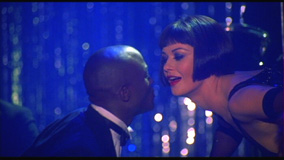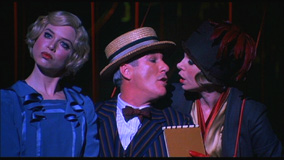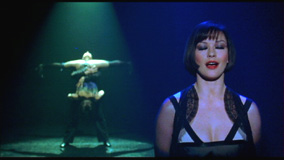Chicago (Rob Marshall, 2002)
 Flashy, but still stage bound, Rob Marshallís adaptation
of the cynical musical Chicago is
supposed to signal some sort of rebirth of the movie musical, but its clumsy
narrative devices and choppy editing make it feel fundamentally embarrassed by
its own genre. Clearly, during the conceptual stages of this film someone
behind-the-scenes someone suspected straightforward delivery of the material
would not be terribly commercial among modern audiences (perhaps proving that
box office flop Newsies is still in
some ways the most influential movie musical these days). From that desire to
make the picture more cinematic, hip, and marketable sprung an idea in which the
bulk of the musical numbers would be delivered not as the castís wonderfully
inexplicable emoting, but as an interior monologue that reflects the
psychological turmoil felt by Roxie (Renee Zellweger), the lead character. This
specious attempt to make us sympathize with Roxie fails primarily because she is
a rather unsympathetic, unrepentant, and conniving killer, but also because
every time the audience sees a reaction shot of Zellweger as she fades into her
Fosse-inspired imagination, the artificiality of these scenes is clubbed over
their head. Itís so extreme that the film seems to be apologizing for trying
to entertain us, as if it were not enough to simply allow a performerís song
and dance routine to carry the movieís weight for a while. Few classic
Hollywood musicals felt it was necessary to explain their inclusion of songs in
this way, but their inherent artificiality was still quite inescapable and
immediately forgivable. To what artistic end Chicago
feels it necessary to make so much out of what other films in the genre have
proven to be nothing is beyond me. With material as slight as this, the
insistence on some sort of psychological truth behind it seems an especially odd
fit. Perhaps Iím too cynical, but only commercial reasons spring to my mind
when I try to justify this maladroit wraparound device.
Flashy, but still stage bound, Rob Marshallís adaptation
of the cynical musical Chicago is
supposed to signal some sort of rebirth of the movie musical, but its clumsy
narrative devices and choppy editing make it feel fundamentally embarrassed by
its own genre. Clearly, during the conceptual stages of this film someone
behind-the-scenes someone suspected straightforward delivery of the material
would not be terribly commercial among modern audiences (perhaps proving that
box office flop Newsies is still in
some ways the most influential movie musical these days). From that desire to
make the picture more cinematic, hip, and marketable sprung an idea in which the
bulk of the musical numbers would be delivered not as the castís wonderfully
inexplicable emoting, but as an interior monologue that reflects the
psychological turmoil felt by Roxie (Renee Zellweger), the lead character. This
specious attempt to make us sympathize with Roxie fails primarily because she is
a rather unsympathetic, unrepentant, and conniving killer, but also because
every time the audience sees a reaction shot of Zellweger as she fades into her
Fosse-inspired imagination, the artificiality of these scenes is clubbed over
their head. Itís so extreme that the film seems to be apologizing for trying
to entertain us, as if it were not enough to simply allow a performerís song
and dance routine to carry the movieís weight for a while. Few classic
Hollywood musicals felt it was necessary to explain their inclusion of songs in
this way, but their inherent artificiality was still quite inescapable and
immediately forgivable. To what artistic end Chicago
feels it necessary to make so much out of what other films in the genre have
proven to be nothing is beyond me. With material as slight as this, the
insistence on some sort of psychological truth behind it seems an especially odd
fit. Perhaps Iím too cynical, but only commercial reasons spring to my mind
when I try to justify this maladroit wraparound device.
 Once the musical numbers start, the editing does nearly
everything it can to inhibit proper evaluation or appreciation of talents of the
performers. I donít think thereís a single shot thatís longer than ten
seconds long in any of the musical numbers, and the snippets provided give the
impression that what is put on screen is an assemblage of the best of an umpteen
number of takes of the same routine, minus any of the actorsí gaffes that
needed to be shot around. When coupled with the common knowledge that the music
in film musicals has been pre-recorded, the lack of impressive, cohesive dance
routines becomes a real blotch on the performances. Much of the energy that the
film manages feels prefabricated and overly calculated.
I can think of few movie musicals that depended less on the talent of its
performers than this one does. The only actor that manages to impress under
these circumstances is Catherine Zeta-Jones, who plays Roxieís ballsy
competitor Velma. The musicalís book consistently insists that its characters
are sexy, but sheís the only one who really exudes any sex appeal. Still, her
performance is less a revelation than an indicator of how much razzle-dazzle her
co-stars lack. Nowhere is this more apparent than in the final number, which
features Zellweger and Zeta-Jones dancing side by side. Ostensibly, a
showstopper, it only underlines Zellwegerís comparative inadequacy as a dancer
(Her best bit in the film, tellingly, is a stand-up routine. Her attempt to
evoke ďDiamonds Are a Girlís Best FriendĒ shame both Monroe and Kidman,
who managed to do so without discrediting herself in last yearís Moulin
Rogue.).
Once the musical numbers start, the editing does nearly
everything it can to inhibit proper evaluation or appreciation of talents of the
performers. I donít think thereís a single shot thatís longer than ten
seconds long in any of the musical numbers, and the snippets provided give the
impression that what is put on screen is an assemblage of the best of an umpteen
number of takes of the same routine, minus any of the actorsí gaffes that
needed to be shot around. When coupled with the common knowledge that the music
in film musicals has been pre-recorded, the lack of impressive, cohesive dance
routines becomes a real blotch on the performances. Much of the energy that the
film manages feels prefabricated and overly calculated.
I can think of few movie musicals that depended less on the talent of its
performers than this one does. The only actor that manages to impress under
these circumstances is Catherine Zeta-Jones, who plays Roxieís ballsy
competitor Velma. The musicalís book consistently insists that its characters
are sexy, but sheís the only one who really exudes any sex appeal. Still, her
performance is less a revelation than an indicator of how much razzle-dazzle her
co-stars lack. Nowhere is this more apparent than in the final number, which
features Zellweger and Zeta-Jones dancing side by side. Ostensibly, a
showstopper, it only underlines Zellwegerís comparative inadequacy as a dancer
(Her best bit in the film, tellingly, is a stand-up routine. Her attempt to
evoke ďDiamonds Are a Girlís Best FriendĒ shame both Monroe and Kidman,
who managed to do so without discrediting herself in last yearís Moulin
Rogue.).
 Itís probably a testament both to the strength of the
original source material and the dearth of competing modern musicals that Chicago
still manages to entertain in stretches. The ďCell-Block TangoĒ number in
particular seems a glimpse at what might have been if Marshall hadnít been
caught up in his post-modern folly. Iíve seen the film three times now (the
latter two viewings were with friends who were watching it for the first time,
not because of any deep desire to revisit the film), and which each viewing my
estimation of the film as a whole decreases, while my appreciation for
Zeta-Jonesí work grows. For every thrilling moment in Chicago,
there are three that could have been done with more gusto. Though itís far
from a fiasco, this film hardly seems a reason to celebrate. One can only hope
that its success brings forth future musicals that better exploit the talents of
those involved.
Itís probably a testament both to the strength of the
original source material and the dearth of competing modern musicals that Chicago
still manages to entertain in stretches. The ďCell-Block TangoĒ number in
particular seems a glimpse at what might have been if Marshall hadnít been
caught up in his post-modern folly. Iíve seen the film three times now (the
latter two viewings were with friends who were watching it for the first time,
not because of any deep desire to revisit the film), and which each viewing my
estimation of the film as a whole decreases, while my appreciation for
Zeta-Jonesí work grows. For every thrilling moment in Chicago,
there are three that could have been done with more gusto. Though itís far
from a fiasco, this film hardly seems a reason to celebrate. One can only hope
that its success brings forth future musicals that better exploit the talents of
those involved.
* * 1/2
01-27-03
Jeremy Heilman